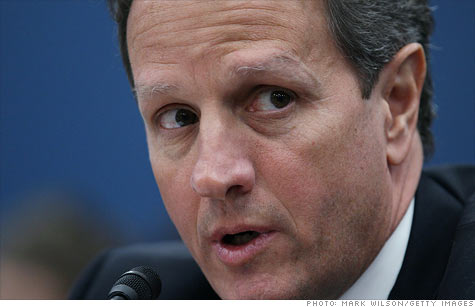Search News

Treasury Secretary Timothy Geithner was grilled by lawmakers last month about why it has taken so long to get money to community bankers.
NEW YORK (CNNMoney) -- Throwing money at a problem doesn't always work.
Case in point: Congress set aside $30 billion for the Small Business Lending Fund passed as part of the Small Business Jobs Act last year.
The fund, run by the Treasury Department, is supposed to pump ultra-cheap capital into banks that have less than $10 billion in assets. The banks, in turn, are supposed to lend the money to small businesses that need it.
But even if every bank application is approved, only $11.8 billion will go out the door.
What happened? Small businesses are supposed to be desperate for loans. Some are. But demand for the program's funds has been lackluster, suggesting many are not.
In much of the country, small businesses are sitting on their hands, nervous about the future, and uninterested in taking on more debt. So they are not demanding loans, and community banks don't need capital.
There are 7,000 community banks across the nation, according to the Independent Community Bankers of America (ICBA). But only 926 -- slightly more than 13% -- of those banks even applied to participate in the program.
"As part of the application, you had to have a small business lending plan to demonstrate that you could deploy this lending," said Paul Merski, executive vice president and chief economist of the ICBA. "You have to have small business loan demand."
In regions of the country hard hit by high unemployment and the collapse in the real estate markets, loan demand is nil, noted Merski.
"You are targeting a subset of community banks -- not all banks -- and you are targeting a subset that has both loan demand and the need for additional capital," he said.
Seacoast National Bank, in Stuart, Fla., didn't even apply for capital from the Treasury. The well capitalized community bank has just over $2 billion in assets with 40 locations along the East coast of Florida.
"We are not going to improve our local economy by lending into this weak environment," said Dennis Hudson, the bank's CEO. "The lending is the eventual result of an improving economy. It doesn't flow the other way."
A long time coming: The Treasury has taken a while to get its program up and out the door.
Wednesday, the department announced the second wave of approvals: a total of $337 million has been invested in 23 banks. More bank approvals will be announced by the Treasury on a rolling basis in coming weeks.
The delay has irked community bankers and their representatives. When Treasury Secretary Timothy Geithner appeared in front of the House Small Business Committee last month, Rep. Herrera Beutler of Washington pressed him aggressively about why the Treasury was taking so long.
"I wish it were different, but the reason we are a little behind schedule is because we are being careful and because the regulators are being careful," said Geithner. "And that is what you would like us -- that is what you want us to be."
Ronald Paul, CEO and chairman of $2.2 billion Eagle Bank Corp., said he was "disappointed in the amount of time it took."
However, he added that the program was worth the wait. The Treasury invested $56.6 million into his Bethesda, Md., bank. "We waited, and we were willing to wait, because we thought it was a great program," he said.
TheTreasury only has two-and-a-half months to approve banks and invest in them by Sept. 27th, one year from the enactment of the original legislation. A Treasury spokesperson said the agency will meet the deadline.
Meanwhile, the rest of the money -- the $18.2 billion -- will go back to Congress.
For a few, it's a good deal: The program is good for banks that fit its parameters.
Take Rusty Cloutier, president and CEO of MidSouth Bank. He was notified last week that his $1.2 billion community bank that serves Southern Louisiana was approved to participate in the program. The Treasury will invest $32 million in MidSouth Bank.
"We are extremely excited about getting it," said Cloutier.
He thinks the money will help the businesses in his community. "Certainly we are trying to get loans out to customers that are creating jobs," said Cloutier. "You know, it is not only creating jobs, it is also saving jobs." ![]()